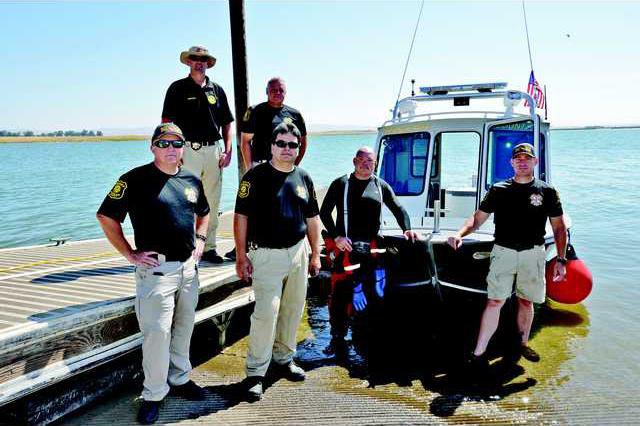Waterways have been busy during the summer in the area, including Woodward Reservoir and rivers packed with rafters, boaters, and swimmers. With the increase in visitors to the reservoirs and the rivers during the summer months, people are sometimes more focused on fun instead of water safety. The Stanislaus County Sheriff's Department Dive Team has been very busy this summer. They hold monthly trainings at the reservoirs and have been out several times on rescues and recovery missions. Their most recent training was at Woodward Reservoir on Aug. 4.
Sheriff Adam Christianson gave all specialty teams their own budget to operate within, which allowed the Dive Team the ability to purchase the necessary equipment.
"It has sped things up and made it safer for the guys," expressed Sergeant Paul Yotsuya. "It is money well spent in my opinion."
The team also had ‘Rescue Randy' on hand for this training session and new sonar technology that has really helped them save time finding their targets and assisting their divers. This summer they have been busy on a regular basis and had just made their way back from Alpine County where they were assisting other agencies in looking for a woman who went missing near Lake Alpine.
Even though Rescue Randy was made for swift water rescue Yotsuya explained that he was supposed to float but they had to drill holes in him so he would sink for their purposes, since much of their work is done at the bottom of a lake, river or reservoir.
"We routinely go to Tuolumne and Calaveras counties to help those teams out because their teams are a little bit smaller than ours," said Yotsuya. "We have equipment for the region that other teams just don't have. Like this sonar unit; it is the only one of its kind in the Central Valley. We will go wherever the request is made."
For the training session the sonar was dipped into the water setting up the Kongsberg MS 1000 which does sector scanning, giving a 360-degree view of the bottom to find Randy, who was placed somewhere in the water as the target that needed to be found. Scott Camire is the sonar expert on the team and has two computer monitors set up to carefully watch the screen to guide the diver to find the target.
There are 12 divers, a sergeant and a lieutenant on the Dive Team that all have various diving experience. Three members of the team have 17-plus years, while the newest diver has about two and a half years.
"I fell in love with what we do and have been doing it ever since," said Yotsuya. "They (the team) do a lot of good work on their own. Everybody is pretty self-sufficient."
The team is a collateral assignment so out of the 12 divers, six are operations, serving as deputies covering patrol or detectives and the other six are with adult detention, which covers the jails.
Since they all have primary duty stations elsewhere within the department, they will only come together as the Dive Team when the need arises.
Yotsuya has been with the Sheriff's Department for 25 years and has spent 17 years on the dive team.
"Just about every drowning at the reservoir is someone that didn't have a life vest on or life jacket," stated Yotsuya on ways to avoid a tragedy in the water. "They are doing something that could have easily been avoided had they worn a personal flotation device or a life jacket.
"Clothing makes a difference and over estimating your swimming ability."
As the team continued its practice session, Camire kept a close watch on the computer monitors and gave the diver directions from watching the sonar screen to what seemed to be their target. The diver was underwater with low, if any, visibility trying to locate Randy while listening to the directions given.
The new technology allows the team to view a short range or a large range underwater that would normally take divers hours to cover. The Dive Team has utilized the sonar to recover drowning victims.
"The last drowning we had, when we used our system it took us four minutes," stated Camire of being able to quickly find a target. "We used it four times this summer for actual recoveries but we use it for training all the time."
Yotsuya added that often when the Dive Team is called in, it's typically because rescue efforts have been unsuccessful.
"When we show up it is usually because it is bad," expressed Yotsuya. "Our main focus is to bring closure to the family. It affects us all differently but it does affect us.
"We take great pride in making the recoveries."





